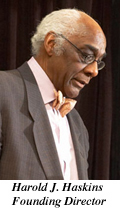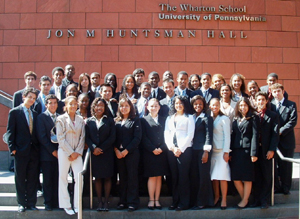

|
Benchmarks |
 |
LEAD adopted the fundamental principle of full financial support for underrepresented minority scholars regardless of wealth or income. Students from low- to middle-income families competed on equal footing with those from wealthy families, creating a paradigm that scholarship, community service and leadership had priority over questions of affordability.
The curriculum is interactive, featuring collaborative learning models. We have attempted to build a shared vision among the students through assigned tasks (case study competition and business plan competition). Writing components embrace liberal arts requirements as well as business principles. Thus, students are immersed in Penn’s academic philosophy through exposure to some elements of the Wharton curriculum, and interaction with faculty members.
Students who have attended the Wharton LEAD Program, experience a sense of community with the University—enhancing their feeling of belonging and allowing them to fit easily into a complex academic environment. They reach a comfort level on campus that provides a safety net— supporting their ability and desire to succeed as a “family”—the beginning of their understanding of college as a bridge to a career. Such consideration is especially important for first generation students and provides another way of binding them to the learning experience. As important, these experiences encourage students to meet future academic challenges at Penn and other universities.
Sixteen Key Components of the Wharton LEAD Curriculum
1980-1999
Sixteen curricular and co-curricular activities were integrated through workshops, tutorials, and coaching activities conducted by Residential Graduate and Undergraduate Coordinators, and Penn undergraduate “consultants.”
• Critical leadership and organizational skills [Workshops]
• Team building activities [Team management processes—Developing, organizing, advising, maintaining groups, etc.]
• Extemporaneous speaking [Specific purpose, exploring subject, presentation formats, notes, outlines]
• Stock Market Tournament [Goldman Sachs Team competition]
• Annual Reports [Instructions on reading annual reports]
• Table Manners [Culinary Habits and Business opportunity]
• Admissions Workshop Penn’s Admission Department [Lee Stetson]
• College Application Process Workshop [Wendy Robbins]
• Financial Aid Workshop “Financial Aid is a Business Transaction” Penn’s Office of Student Financial Services [Michael Brosnan, Gloria Jones]
• College Day: scheduled visits and recruitment workshops by Admissions officials [representing Penn, Yale, Georgetown, Swarthmore, Haverford, Princeton, and Bryn Mawr].
• Eight Case Presentation Workshops to develop case presentation skills for corporate cases, case analysis (writing and revising), problem statements, (ambiguity and clarity), revision strategies, editing, style, techniques of dynamic delivery, using visual aids, briefings (conducting question and answer sessions).
• Corporate case study presented to corporations by LEAD participants, The Pepsid Case (McNeil Consumer Products Company).
• Credit Suisse/First Boston Corporation Case Study was unveiled for the first time on a field trip to New York in 1997. As a significant addition to the curriculum, participants were introduced to a real time corporate financing deal by three financial entities (Credit Suisse/First Boston Corporation, John Hancock Insurance, and CIGNA). Students prepared and presented their findings before a panel of officials at Eagle Lodge in Philadelphia.
• Business Plan Competition: Six teams of five students each prepared and presented original business plans in a one month competition. Teams supported by Wharton Small Business Development Center (SBDC) consultants for workshops on marketing, financials, and product development. Feasibility Analysis, Identifying and Reaching an Appropriate Market, Financial Analysis and Management Techniques, Basic Legal Issues and the Importance of Business Planning.
• Essay Contest: assignments in ten topic areas—Leadership, Teamwork, and Communication in the Workplace, Social Responsibility, Valuing Diversity, Marketing, Entrepreneurship, Public Policy and Management, Management and the Arts, and Business and Education.
• QUEST, the Wharton LEAD Yearbook, annual publication—student essay winners, profiles on corporate executives, profiles on Wharton faculty, other articles of interest, photographs, advertisements, and formal recognition of corporate contributions.
University Recruitment
LEAD has become a major University recruitment mechanism for talented minority candidates enrolled in the four undergraduate schools. Approximately 358 LEAD alumni from 10 LEAD affiliate programs at various universities have matriculated at Penn over 19 years (1980-1999), with 186 at Wharton, 139 in the College, 31 in the Engineering, and two in Nursing.
Of that group, approximately 132 alumni from Wharton LEAD Program matriculated at Penn, with 80 undergraduates at Wharton, 46 in the College, five in Engineering and one in Nursing.
 |
2005 LEAD Group Photo |
In a survey of 193 LEAD alumni enrolled in Penn’s four undergraduate schools, their cumulative GPA is greater than 2.8. The highest GPA reported is 3.92, while the lowest figure is 1.03. These students are Penn undergraduate enrollees, classes 1985-1999. A significant number of these students were leaders of student organizations and clubs at Penn.
Robert Aresty Scholarship
In 1999, Wharton alumnus Robert Aresty, established a scholarship for LEAD students who were admitted to Penn but could not have enrolled without his financial support. His contribution of $144,000 supports 63 undergraduates in Wharton, the College, and SEAS, as well as a number of LEAD junior and senior undergraduates who encountered financial hardship. The Aresty Scholarship is well known throughout the Penn community for its impact on retention and development of under-represented minority students.
—Harold J. Haskins, Executive Consultant Wharton LEAD Program,
Director, Student Development Support Planning
Celebrating Milestones and Supporting LEAD
Barbara Kahn, vice dean of Wharton’s Undergraduate Division, stated, “Established at Wharton, LEAD exposes students to the full breadth of Wharton’s undergraduate core curriculum, introducing them to the principles of finance, economics, management, and marketing. The program also serves as a vital feeder system for the nation’s top business schools and Penn’s undergraduate schools. It really has a significant impact on the University and—most importantly—on the lives of LEAD participants.”
Each summer, Wharton’s four-week LEAD Program invites more than 30 students to attend lectures by the School’s faculty and corporate executives in Jon M. Huntsman Hall. Students also engage in challenging team-based assignments. Throughout the program, participants are given the opportunity to visit major corporations in Philadelphia, Washington D.C. and New York City, establishing the lasting relationships essential to a successful business career.
The School celebrated the program’s quarter-century milestone this summer with a two-day Wharton LEAD event, kicked off by an alumni dinner in July. The banquet brought together past and present leadership and faculty of the program with alumni and current students. At the dinner, a $100,000-gift was announced from Ashish, W ’92 and his wife, Sapna Shah, C/W ’93 to support the continued development and implementation of the Wharton LEAD Program.
The nationwide organization that has grown out of the Wharton LEAD program now has over 6,600 alumni, many of whom have gone on to successful careers in the corporate world. Sixty percent of the program’s alumni are currently pursuing careers in business and 50 percent have received or currently are enrolled in an M.B.A. program. At all of the LEAD summer institutes, participants are exposed to a similar curriculum, with an overriding focus on the establishment of lifelong partnerships between outstanding students and the nation’s leading corporations and business schools.

